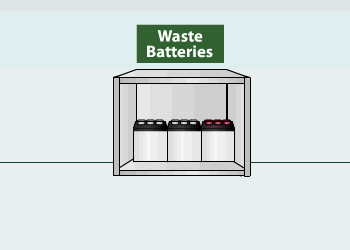
Waste Battery
Waste Batteries generated by the Vehicle Repair Trade
In accordance with the Waste Disposal (Chemical Waste)(General) Regulation (Cap. 354C), used lead-acid batteries are classified as chemical waste and controlled by the said Regulation, irrespective of whether they contain battery solution. In this respect, practitioners in the vehicle repair trade should dispose of the waste batteries as chemical waste.
The law requires trade practitioners to hand waste batteries over to licenced chemical waste collectors for collection and delivery to approved facilities for treatment. Alternatively, they can apply for chemical waste collector licences from the Environmental Protection Department and handle waste batteries themselves.
Treatment of Chemical Waste - Pollution caused by waste batteries
Improper handling of waste batteries may cause leakage of chemicals such as suphuric acid and lead, polluting soil and underground water. Pollutants, such as, lead, suphuric acid, etc., are harmful to human being, animals and damage to the environment. Trade partititoners should arrange licenced waste collectors to collect and deliver the waste batteries to approved facilities for treatment. It is an offence to dispose of waste batteries improperly, the penalty including fine and imprisonment terms.
Handling Waste Chemicals - Waste Batteries
-
Register as a Chemical Waste Producer with the Environmental Protection Department
-
Handle waste batteries with care and avoid chemicals such as lead and sulphuric acid from contaminating soil or drains
-
Storage of waste batteries
-
To avoid spillage of acidic solution, waste batteries should be stored in an upright position
-
Do not stack waste batteries to avoid short-circuiting or leakage of acidic solution from broken battery cases
-
Do not store in places of high temperatures to avoid case ruptures
-
Store waste batteries separately from other waste chemicals
-
Avoid contact with water
-
If necessary, separate acidic solution from waste batteries. The acidic solution and the remaining of waste batteries, both being chemical wastes, should be stored separately
-
-
Storage Area for Chemical Waste
-
Chemical waste should be stored at designated areas having walls or partitions and with impermeable floor or surface which do not react chemically with the waste or in purposely-built chemical waste storage cupboard.
-
There should not be any connection to surface water drains or foul sewers.
-
No rainwater nor waste water should be allowed to flow into or accumulate in storage areas.
-
Chemical waste storage areas should display a hazard warning sign, panel, notice or marking. The sign, panel, notice or marking should indicate in bold legible red English words and Chinese characters not less than 6 cm in height on a white background "化學廢物 CHEMICAL WASTE".
-
Containers for chemical wastes should be suitably labeled.
-
Promptly arrange delivery of chemical wastes away from storage areas to avoid accidents
-
-
Collection and Delivery of Waste Batteries
-
Hire licenced chemical waste collectors to collect and transport waste batteries to approved treatment facilities for treatment
-
Import and Export of Chemical Wastes - Waste Batteries
-
Any person conducting import or export of chemical waste must obtain a permit from the Environmental Protection Department in accordance with the Waste Disposal Ordinance (Cap. 354).
-
Hire licenced chemical waste collectors to collect and transport chemical wastes to import/export handling facilities, and show permit to the Authority.
-
-
-
Retain trip tickets for 12 months for inspection by law enforcement personnels
-
Handling of battery leakage
-
Promptly put leaking batteries into leak-proof acid-resistant containers
-
Do not use water to wash away leaks and let the contaminated water go down the drain. Instead, use proper materials such as dry fine sand or absorbent cloth to clean up the leaks.
-
Put materials contaminated with acidic solution into sealed acid resistant disposal bags and handle them as chemical wastes
-
If the leak is likely to cause serious pollution to the locality or adversely affect the environment, promptly seek help from the Fire Services Department (FSD) and inform the Environmental Protection Department (EPD) as soon as possible.
-
During office hours: Call
-
FSD's emergency hotline at 999; and
-
EPD's hotline at 2838 3111.
-
-
After office hours:
promptly call FSD's emergency hotline.
-
Tips
Personal safety and protective gears Basic personal protective gears for handling chemical wastes
-
Chemical resistant gloves or long gloves
-
Safety goggles or spectacles
-
Protective clothings or overalls
-
Suitable face shields
-
Eye-washing facilities
-
First aid box
Consumers' Considerations
-
Purchase high efficiency and durable batteries.
-
Proper care for batteries (such as timely replenishment of distilled water and charging) to keep batteries at optimum condition.
-
Battery shop will normally provide service to the recycle waste batteries.
List of Licensed Chemical Waste Collectors (Waste Battery)
A Guide to the Chemical Waste Control Scheme
A Guide to the Registration of Chemical Waste Producers
Code of Practice on the Packaging, Labelling and Storage of Chemical Wastes
